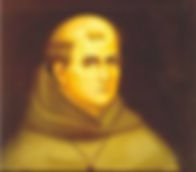One author stated Saint Junipero Serra is one of the most written-about saints in the history of the Catholic Church. This is in part thanks to the account written by his best friend and fellow missionary, Father Francisco Palou, the detailed reports/letters he submitted to the Franciscan superiors and military leaders, and the fact that he is one of the Church's more contemporary saints.
Father Junipero was born Jose Miguel Serra. Translated to English, this is Joseph Michael. Incidentally, my brother is Joseph Michael, so it was very sweet for me to learn Father's given name. Jose/Joseph means "who pardons". Miguel/Michael means "who is like God", as in Saint Michael the Archangel.

Saint Junipero Serra's life spanned 70 years, 9 months, and 4 days.
He was a layperson (non-religious) for 16 years, 9 months, and 21 days.
He was a professed religious friar of the Order of Friars Minor, the Franciscans, for 53 years, 11 months, and 13 days.
He was a missionary for 35 years and 13 days.
Everything I read reveals Saint Junipero (pronounced "who-nee-pear-o", stress the nee and roll the Spanish "r") was a complex man. He was not 2-dimensional as we can sometimes come to think of people when we read about only their good qualities. The only biographer who tends to paint him close to perfection was his best friend, Father Francisco Palou. I believe we all hope our best friends will speak and write about only our virtues, too.
A fellow friar described him as medium height, having a slight beard, and with swarthy dark eyes and hair. Now, I laughed out loud when I read this description. I can't imagine any monks I know describing one another as swarthy! For me, the word swarthy conjures up the image of Douglass Fairbanks playing a pirate in a 1920s silent film. Then my brain puts him in a brown, wool robe with a tonsure haircut. You can see why I laughed out loud. Apologies, I digress!
Father Junipero was definitely a man of his time. He was born and grew up in Majorca, Spain, an island in the Mediterranean Sea. Majorca suffered repeated droughts during the 1700s. I imagine growing up in a place where water could be scarce and raising livestock and crops was nearly impossible contributed to his insistence the missions be agriculturally focused.
During young Jose Miguel Serra's life, he saw the suffering in Majorca resulting from the island's support of the vanquished opponent in the Spanish War of Succession. The new king imposed strict Spanish rule on the island in retribution for their transgression. This must have fueled Father Serra's distaste and outright subversion of the various military commanders he would encounter in New Spain (now Mexico) and Alta California.
During the Spanish Inquisition, on the island of Majorca, Father Junipero served as a document reviewer. He was never involved in any of the ugly side of the Inquisition but he read enough reports to give him a healthy dose of skepticism regarding people who suddenly claimed 100% Catholic conversion overnight. In his role as a priest, he knew true conversion to the faith was a gradual process. He saw education and immersion over time as the best route to giving up previous religious traditions.
Growing up, living, and working on Majorca also gave Father Serra the experience of seeing women in the textile industry. He witnessed women contributing to the economic well-being of their families and their communities. This most certainly influenced his involvement of the indigenous women in the Alta California missions' work.
The image of Saint Junipero Serra is the official image from his canonization by the Catholic Church.
My resources for these posts are:
Palou, F. & Watson, D. S. (1934). The expedition into California of the Venerable Padre Fray
Junipero Serra and his companions in the year 1769. Nueva California Press.
Beebe, R. M. & Senkawicz, R. (2015). Before Gold: California under Spain and Mexico,
Volume 3. Junipero Serra: California, Indians, and the transformation of a
missionary. University of Oklahoma Press.
Geiger, M. J. (1959). The Life and Times of Fray Junipero Serra, O. F M.: The man who never
turned back. Academy Of American Franciscan History.